Text
“If the hour’s wage is fixed in such a way that the capitalist does not bind himself to pay a day’s or a week’s wage, but only to pay wages for the hours during which he chooses to employ the worker, he can employ him for a shorter time than that which is originally the basis of the calculation of the wages for the hour, or the unit of measurement for the price of labour. Since this unit is determined by the ratio of the daily value of labour-power to the working day of a given number of hours, it naturally loses all meaning as soon as the working day ceases to contain a definite number of hours. The connection between paid and unpaid labour is destroyed. The capitalist can now wring from the worker a certain quantity of surplus labour without allowing him the labour time necessary for his own subsistence. He can annihilate all regularity of employment, and according to his own convenience, caprice, and the interest of the moment, make the most frightful over-work alternate with relative or absolute cessation of work. He can abnormally lengthen the working day without giving the worker any corresponding compensation, under the pretence of paying ‘the normal price of labour.’”
— Karl Marx in Capital Volume 1, explaining zero hours contracts about 150 years before they came about proper (via peoplescommissariat)
2K notes
·
View notes
Text
“Medusa lost her beauty—or rather, it was taken from her. Beauty is always something you can lose. Women’s beauty is seen as something separate from us, something we owe but never own: We are its stewards, not its beneficiaries. We tend it like a garden where we do not live. Oh, but ugliness—ugliness is always yours. Almost everyone has some innate kernel of grotesquerie; even fashion models (I’ve heard) tend to look a bit strange and froggish in person, having been gifted with naturally level faces that pool light luminously instead of breaking it into shards. And everyone has the ability to mine their ugliness, to emphasize and magnify it, to distort even those parts of themselves that fall within acceptable bounds. Where beauty is narrow and constrained, ugliness is an entire galaxy, a myriad of sparkling paths that lurch crazily away from the ideal. There are so few ways to look perfect, but there are thousands of ways to look monstrous, surprising, upsetting, outlandish, or odd. Thousands of stories to tell in dozens of languages: the languages of strong features or weak chins, the languages of garish makeup and weird haircuts and startling clothes, fat and bony and hairy languages, the languages of any kind of beauty that’s not white. Nose languages, eyebrow languages, piercing and tattoo languages, languages of blemish and birthmark and scar. When you give up trying to declare yourself acceptable, there are so many new things to say.”
— What If We Cultivated Our Ugliness? Jess Zimmerman.
(via kuanios)
20K notes
·
View notes
Text
so here is (some of) why I don’t buy into actors’ feigned remorse over having worked with woody allen & subsequent “charity” - primarily in the form of their allen-signed cheques - as penance for their complacency.
as you will see below, woody allen is not known for being a profitable director. though he has had successes in some european countries, his films have largely flopped financially in other countries since he was first found in possession of child pornography of his wife’s adopted daughter in 1994, and, as a result, allen had to significantly cut the wages of his employees to break even on his later films.

1998: “One of the reasons studios loved being in business with Woody, and were happy to break even, was that surely he was one of the world’s great directors and there was a public relations value of being in business with him,” said one of Mr. Allen’s associates, who insisted on anonymity. Once the affair became public, “that value was diluted,” the associate said, adding, “People weren’t knocking down the doors to do business with him.”
Except, that is, actors.
So it begs the question, which we can see Ewan Mcgregor in 2008 attempt to answer:
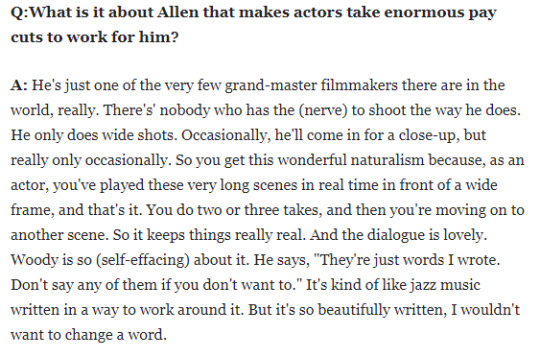
Similarily, Liam Neeson cited in 2017:
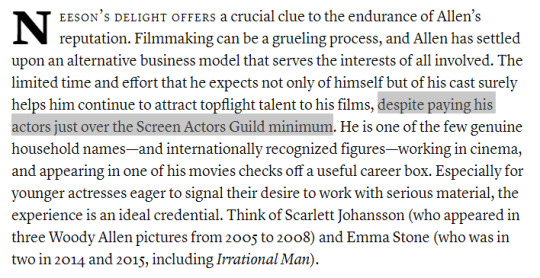
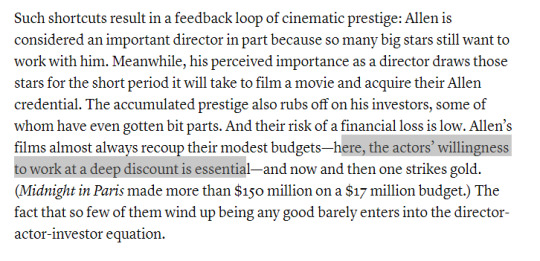
so as we can see from as early as 1994, when woody allen was first found with child pornography, only two years after he was reported to have molested his biological daughter as well, publicists have warned actor’s on the comparative value of working on one of his films. and in the decades following, actors have continued to line up for a role in one of his films, citing his artistic style as reason enough to disregard prior ‘allegations’ against him.
the later unfortunately titled NYT article “Can Woody Allen Work in Hollywood Again?” (2018) references some of the apologies that have since come from the #MeToo movement - unfortunately as it appears even repetitive public callouts over the last four years by Dylan Farrow (allen’s daughter) herself was not enough to garner an apology from actors until there was some kind of external incentive (hashtag TimesUp).
After Ms. Farrow called out actors for supporting #MeToo while also working with Mr. Allen, several stars of “Rainy Day,” including Timothée Chalamet and Rebecca Hall, publicly donated their salaries from [Woody Allen] to charities and Time’s Up, the Hollywood campaign against harassment and assault.
in the greater context of woody allen’s history as a filmmaker and as an employer, it’s going to take a lot more than aptly timed charity to explain away hollywood actors’ long-running (and seemingly unending) support of woody allen.
356 notes
·
View notes
Photo
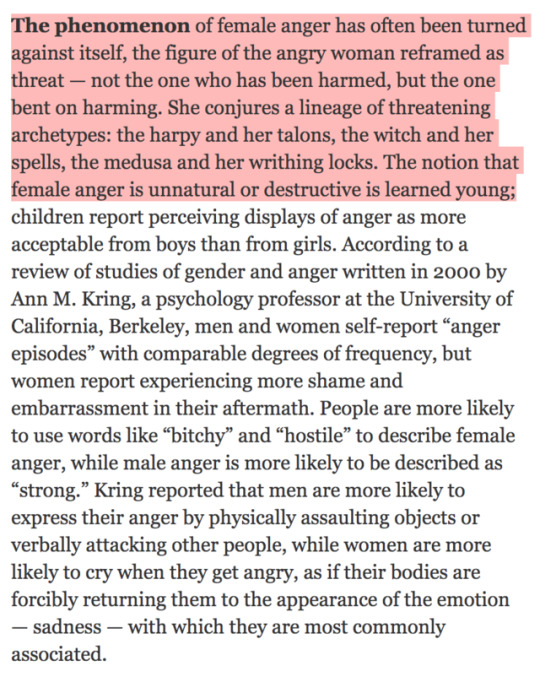
Leslie Jamison, “I Used to Insist I Didn’t Get Angry. Not Anymore.”
19K notes
·
View notes
Text
It’s interesting how people tend to mis/use ‘compulsory heterosexuality’ and ‘toxic masculinity’ in identical ways– they’re supposed to describe society-wide patterns of socialization as they relate to sex/gender and power, but people have transformed both of them into ‘conditions’ from which an individual may ‘suffer’ and then be ‘healed’ through enlightened thinking.
6K notes
·
View notes
Note
I re-read your recent reblog about "roots of the ‘symptoms" over and over and I'm still having some trouble really understanding what it means :s It's about how healing is more about molding the person to be subservient to capitalism?
(in reference to this post)
basically what this post is saying is that mental illnesses (such as depression, anxiety, schizophrenia, etc.) aren’t prediscursive–that is, they’re not prior to discourse, they don’t exist before they are described. categorised mental illnesses aren’t things that just naturally exist in the world and then capitalism / science / psychiatry / what have you comes along and describes them.
rather, everything from the concept of “mental illness” itself (”disorder,” which is supposed to exist in contrast to some ideal state of mental wellness, “order”) to the specific symptoms and groupings of symptoms / diagnoses that psychiatry describes, are constructed by empire and capital (”the classifications and pathologizations discursively constitutive of mental illness are produced by power”).
(you can see evidence of this historically with how certain mental illness categorisations were / are used in order to pathologize (that is, describe as abnormal / unhealthy / diseased) unwanted behaviour in women n in racialised subjects under capitalism: see hysteria n a number of other “women’s diseases”; drapetomania + schizophrenia n other things applied to “rebellious” Black people; “homosexuality” and “transsexuality” being treated as mental illnesses, etc.)
therefore it’s not accurate or productive to say things like “capitalism causes people to have anxiety / depression / schizophrenia, etc.” because it’s acting like mental illness itself, and these specific mental illness categories, are some kind of inherent biological thing, rather than something that capitalism itself made up (it “positions the “dis-order” as transcendental, as some formal and pre-discursive biological or phenomenological truth”). it doesn’t get to the root of the issue.
the second paragraph of the post expounds upon this point and explains how it is that capitalism produces mental illness and its classifications:
the conditions of capitalism and empire work to create a class of subjects (read: all of us) who are used to working and thinking in the way that capitalism demands. capitalism constructs certain spaces, resources, information, and ways of relating to our world + to each other to be inaccessible to certain people, and then pathologizes those people as “disabled.” it forces people to work in certain ways, and then pathologizes and constructs as “other” people who are unable to do so due to “mental and physical differences”–so the concept of what “mentally ill” / “disabled” even means is defined by, and in reference to, capitalism.
capitalism then uses the sciences of psychiatry / psychology / biology to provide a justification for that pathologization and act like it’s a natural, innate thing (”the conditions of class society actively produce the differences which are labeled as mental illness, while simultaneously producing the biological-psychological knowledge system used to normalize”).
so we can’t just talk about how capitalism makes people mentally ill: we have to problematize (that is, treat as a problem) the entire concept of mental illness in the first place.
2K notes
·
View notes
Photo

Poster for the International Jazz Festival in Dortmund, Germany (1976). Designed by Günther Kieser.
45K notes
·
View notes
Text
call me captain obvious but the difference between how the parkland teens & the ferguson protesters were/are treated during protest & portrayed in media isn’t just like a matter of (for lack of a better term) post-hoc racism & antiblackness whereby white and Black people doing the same thing will be treated in different ways. the reason that the ferguson protesters were treated in ways spanning the range of dismissal, criminalisation, and police surveillance, violence & brutality wasn’t solely because individual protesters were Black per se but because their entire experience & platform was shaped by the experience of Blackness/racialisation, aka in order to defend their right to. exist freely, with the respect they deserve, safe from fear, they had to be against militarisation of the police, police violence, etc.. the reason the parkland teens can be treated with comparative respect & deference & magazine covers etc. isn’t just because “they’re white aka people will be more inclined to make positive value judgements about them” but also because “they’re white aka they exist under material circumstances that make it very easy for their platform to be subsumed into a capitalist police state & even to advance the goals of that police state.” we’re not looking at racism as attitude aka people being valuated differently for engaging in the same behaviour, but racism as structure aka people being.. constituted such that very different goals & behaviours are even available to them, & some of those behaviours are in line with the goals of a police state & some of them (by design) are not. there’s a difference between protesting to protect your lives if you’re (largely) the people whom police are designed to protect vs. if you’re (largely) the people they’re designed to harm. we need to implicate more in an analysis of racism & anti-Blackness than attitude, even “mass” or “collective” attitude. again ignore me if this is obvious but I feel from some people’s wording that they’re going the “attitude” approach
2K notes
·
View notes
Link
this article really went there:
Craft culture looks like white people. The founders, so many former lawyers or bankers or advertising execs, tend to be white, the front-facing staff in their custom denim aprons tend to be white, the clientele sipping $10 beers tends to be white. Craft culture tells mostly white stories for mostly white consumers, and they nearly always sound the same: It begins somewhere remote-sounding like the mountains of Cottonwood, Idaho, or someplace quirky like a basement in Fort Collins, Colorado, or a loft in Brooklyn, where a (white) artisan, who has a vision of back in the day, when the food was real and the labor that produced it neither alienated nor obscured — and discovers a long-forgotten technique, plucked from an ur-knowledge as old as thought and a truth as pure as the soul.
These techniques and the goods they produce do have origins, specific ones rooted in history and in people. The character of craft culture, a special blend of bohemianism and capitalism, is not merely overwhelmingly white — a function of who generally has the wealth to start those microbreweries and old-school butcher shops, and to patronize them — it consistently engages in the erasure or exploitation of people of color whose intellectual and manual labor are often the foundation of the practices that transform so many of these small pleasures into something artful.
990 notes
·
View notes
Photo
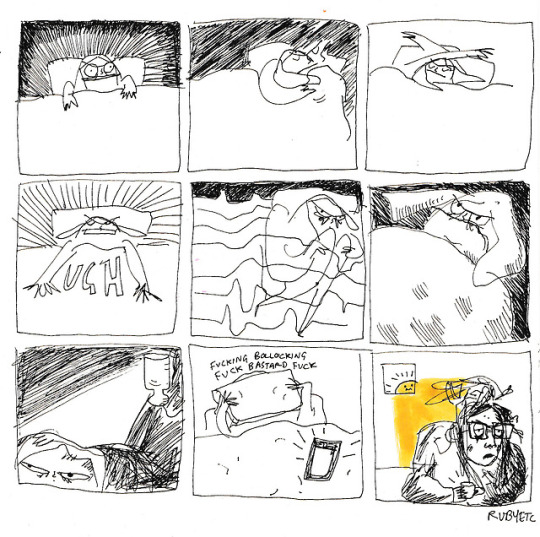
here are the drawings of I can’t sleep
#c'est moi lately#plus sometimes my cat sleeps on top of me while i'm grumpy & awake#feels like a confused rendition of bremer stadtmusikanten#town musicians of bremen?#ruby elliot
1K notes
·
View notes
Text
Throughout her translation of the “Odyssey,” Wilson has made small but, it turns out, radical changes to the way many key scenes of the epic are presented — “radical” in that, in 400 years of versions of the poem, no translator has made the kinds of alterations Wilson has, changes that go to truing a text that, as she says, has through translation accumulated distortions that affect the way even scholars who read Greek discuss the original. These changes seem, at each turn, to ask us to appreciate the gravity of the events that are unfolding, the human cost of differences of mind.
The first of these changes is in the very first line. You might be inclined to suppose that, over the course of nearly half a millennium, we must have reached a consensus on the English equivalent for an old Greek word, polytropos. But to consult Wilson’s 60 some predecessors, living and dead, is to find that consensus has been hard to come by…
Of the 60 or so answers to the polytropos question to date, the 36 given above [which I cut because there were a lot] couldn’t be less uniform (the two dozen I omit repeat, with minor variations, earlier solutions); what unites them is that their translators largely ignore the ambiguity built into the word they’re translating. Most opt for straightforward assertions of Odysseus’s nature, descriptions running from the positive (crafty, sagacious, versatile) to the negative (shifty, restless, cunning). Only Norgate (“of many a turn”) and Cook (“of many turns”) preserve the Greek roots as Wilson describes them — poly(“many”), tropos (“turn”) — answers that, if you produced them as a student of classics, much of whose education is spent translating Greek and Latin and being marked correct or incorrect based on your knowledge of the dictionary definitions, would earn you an A. But to the modern English reader who does not know Greek, does “a man of many turns” suggest the doubleness of the original word — a man who is either supremely in control of his life or who has lost control of it? Of the existing translations, it seems to me that none get across to a reader without Greek the open question that, in fact, is the opening question of the “Odyssey,” one embedded in the fifth word in its first line: What sort of man is Odysseus?
“I wanted there to be a sense,” Wilson told me, that “maybe there is something wrong with this guy. You want to have a sense of anxiety about this character, and that there are going to be layers we see unfolded. We don’t quite know what the layers are yet. So I wanted the reader to be told: be on the lookout for a text that’s not going to be interpretively straightforward.”
Here is how Wilson’s “Odyssey” begins. Her fifth word is also her solution to the Greek poem’s fifth word — to polytropos:
Tell me about a complicated man.
Muse, tell me how he wandered and was lost
when he had wrecked the holy town of Troy,
and where he went, and who he met, the pain
he suffered in the storms at sea, and how
he worked to save his life and bring his men
back home. He failed to keep them safe; poor fools,
they ate the Sun God’s cattle, and the god
kept them from home. Now goddess, child of Zeus,
tell the old story for our modern times.
Find the beginning.
When I first read these lines early this summer in The Paris Review, which published an excerpt, I was floored. I’d never read an “Odyssey” that sounded like this. It had such directness, the lines feeling not as if they were being fed into iambic pentameter because of some strategic decision but because the meter was a natural mode for its speaker. The subtle sewing through of the fittingly wavelike W-words in the first half (“wandered … wrecked … where … worked”) and the stormy S-words that knit together the second half, marrying the waves to the storm in which this man will suffer, made the terse injunctions to the muse that frame this prologue to the poem (“Tell me about …” and “Find the beginning”) seem as if they might actually answer the puzzle posed by Homer’s polytropos and Odysseus’s complicated nature.
Complicated: the brilliance of Wilson’s choice is, in part, its seeming straightforwardness. But no less than that of polytropos, the etymology of “complicated” is revealing. From the Latin verb complicare, it means “to fold together.” No, we don’t think of that root when we call someone complicated, but it’s what we mean: that they’re compound, several things folded into one, difficult to unravel, pull apart, understand.
“It feels,” I told Wilson, “with your choice of ‘complicated,’ that you planted a flag.”
“It is a flag,” she said.
“It says, ‘Guess what?’ — ”
“ ‘ — this is different.’ ”
The First Woman to Translate the Odyssey Into English, Wyatt Mason
34K notes
·
View notes
Text
Oyèrónkẹ́ Oyěwùmí in “The White Woman’s Burden: African Women in Western Feminist Discourse”:
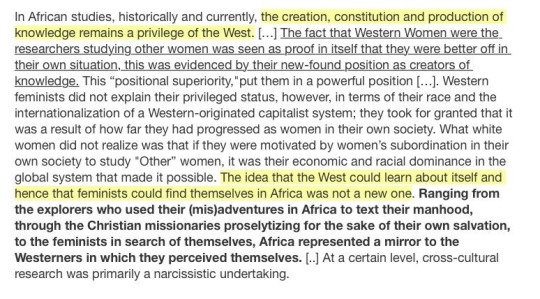
[In African studies, historically and currently, the creation, constitution and production of knowledge remains a privilege of the West. […] The fact that Western Women were the researchers studying other women as seen was proof in itself that they were better off in their own situation, this was evidenced by their new-found position as creators of knowledge. This “positional superiority”, put them in a powerful position […] Western feminists did not explain their privileged status, however, in terms of their race and the internalization of a Western-originated capitalist system; they took for granted that it was a result of how far they had progressed as women in their own society. What white women did not realize was if they were motivated by women’s subordination in their society to study “Other” women, it was their economic and racial dominance in the global system that made it possible. The idea that the West could learn about itself and hence that feminists could find themselves in Africa was not a new one. Ranging from the explorers who used their (mis)adventures in Africa to text their manhood, through the Christian missionaries proselytizing for the sake of their own salvation, to the feminists in search of themselves, Africa represented a mirror to the Westerners in which they perceived themselves. […] At a certain level, cross-cultural research was primarily a narcissistic undertaking.]
#white feminism#white womanhood#oyèrónkẹ́ oyěwùmí#the white woman's burden#african women in western feminist discourse
121 notes
·
View notes
Quote
ABUSIVE MEN COME in every personality type, arise from good childhoods and bad ones, are macho men or gentle, “liberated” men. No psychological test can distinguish an abusive man from a respectful one. Abusiveness is not a product of a man’s emotional injuries or of deficits in his skills. In reality, abuse springs from a man’s early cultural training, his key male role models, and his peer influences. In other words, abuse is a problem of values, not of psychology.
Lundy Bancroft, “Why does He Do That? Inside the Minds of Angry and Controlling Men.”
38K notes
·
View notes
Text
Feminist Resources
Audre Lorde’s The Master’s Tools Will Never Dismantle the Master’s House
Audre Lorde’s Uses of the Erotic: The Erotic as Power
Aurora Levins Morales’s Radical Pleasure: Sex and the End of Victimhood
bell hooks’ Cultural Criticism & Transformation
Chandra Talpade Mohanty’s Under Western Eyes: Feminist Scholarship and Colonial Discourses
Combahee River Collective Statement
Dorothy Allison’s A Question of Class
Judith Butler documentary
Leslie Feinberg’s We Are All Works in Progress
Paula Gunn Allen’s Who is Your Mother?: Red Roots of White Feminism
R.W. Connell’s The Social Organization of Masculinity
Sandra Lee Bartky’s Foucault, Femininity, and the Modernization of Patriarchal Power
Sandra Cisneros’s Guadalupe the Sex Goddess
Sojourner Truth’s Ain’t I a Woman?
Susan Bordo’s The Body and the Reproduction of Femininity
#feminism#feminist resources#audre lorde#aurora levins morales#bell hooks#chandra talpade mohanty#dorothy allison#judith butler#leslie feinberg#paula gunn allen#r w connell#sandra lee bartky#sandra cisneros#sojourner truth#susan bordo
17K notes
·
View notes
Photo
[The four images are screenshots of a twitter thread by Professor Carol Anderson, @ProfCAnderson:
»Thread, so bear with me. 1) 45's regime is an attempt to re-create the 1920s. Pres. Warren G. Harding was sexually corrupt and not smart.«
»2) He had several in his Cabinet that kept the ship of state afloat, but most were as corrupt (some even more so) and saw US as personal ATM«
»3) Albert Fall, for example, was determined to sell off public lands to big oil in order to enrich himself.«
»4) Others used their insider positions in the White House for kickbacks & graft. When it's said the fish rots from the head, that happened.«
»5) Wall St. was wild; banks borrowed to play the stock market, and without regulations sent the global economy into the Great Depression.«
»6) Under the veneer of a very wealthy nation seethed economic and racial tensions. The agricultural sector was in a depression before 1929«
»7) The 1924 National Origins Act banned immigration from Asia, limited it from non-protestant nations & privileged Anglo-Saxon Britain.«
»8) After the 1915 showing of Birth of a Nation, the KKK had a resurgence. By the 1920s it had political power in Indiana and US Congress.«
»9) Racial violence against African Americans, such as in Tulsa 1921, was often committed by and then sanctioned by the state.«
»10) Harding's VP was biblically morally rigid & a deep believer that what was good for business was good for America -- even when it wasn't.«
»11) That "moral rectitude" meant that poverty was solely a personal failing. Charities could step in to help but there was no role for govt«
»12) Women, even though they had just won the right to vote, were hardly equal in the 1920s. They needed to stay in their subordinate place.«
»13) The US had renounced the League of Nation. And in the 1930s when Hitler's threat became clear, homegrown fascists blocked US response.«
»14) So look at 45's policies--embrace KKK, Muslim ban, deportations, militarize police, destabilize US alliances, remove regulations, . . .«
»15) gut safety net for the poor and say it's because they want govt to do everything for them, attempt to reduce public lands«
»16) curtail women's access to birth control to put wome back in their place and eliminate the freedom to make choices about their own lives,«
»17) greatly limit the right to vote to ensure that Jim Crow disfranchisement can once again become the law of the land,«
»18) create a labor force without rights while the government uses its power to shield businesses from the consequences of horrific practices«
»19) MAGA looks backwards and creates a false '20s history of prosperity & peace; when it was anything but. This is 45's recipe for disaster.«]
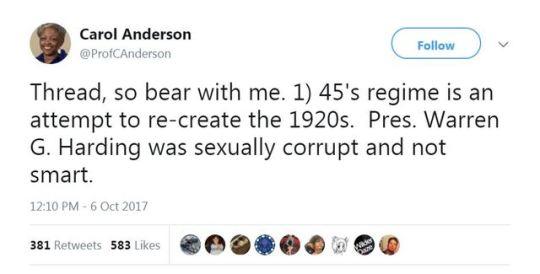
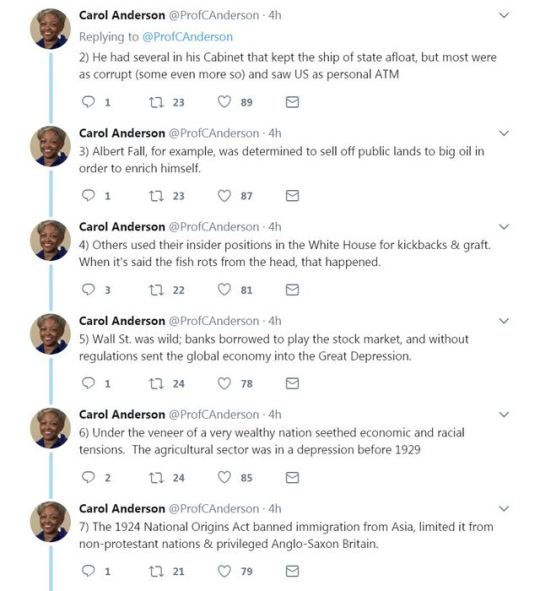
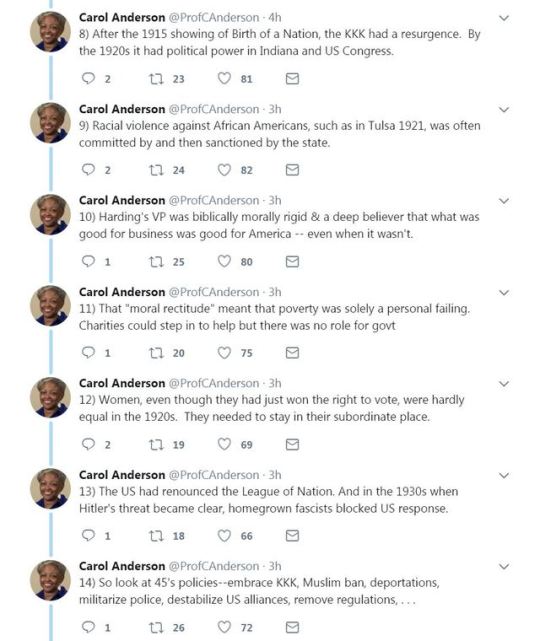
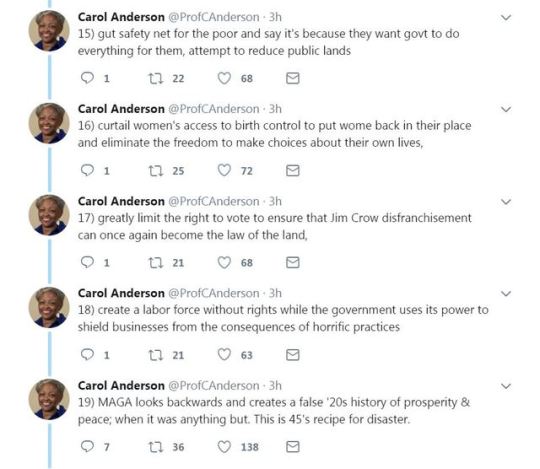
Emory Professor Carol Anderson lays out the scale of the problem facing America. Media outlets should talk about this.
2K notes
·
View notes
Photo

Pina Bausch by Wim Wenders
107 notes
·
View notes